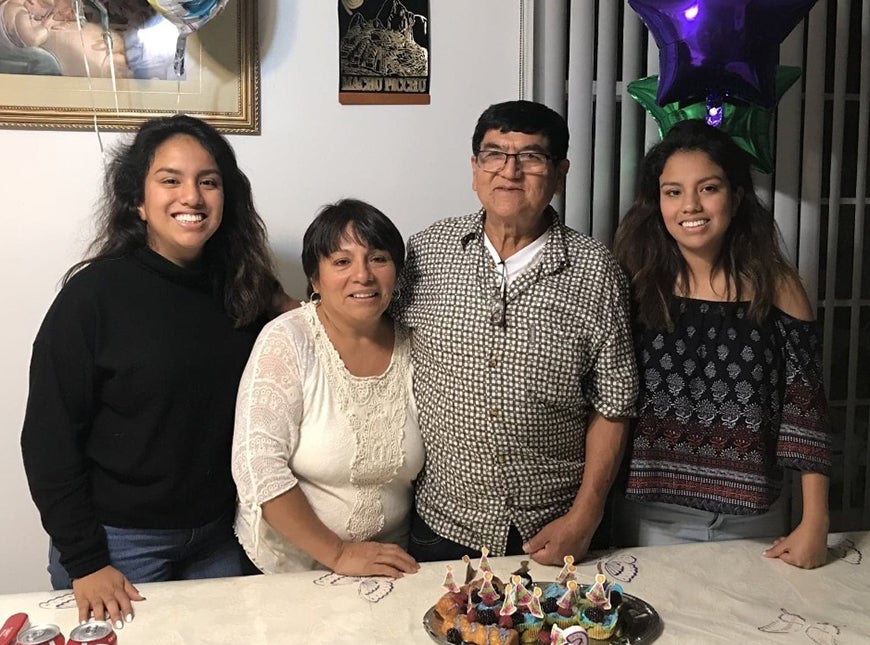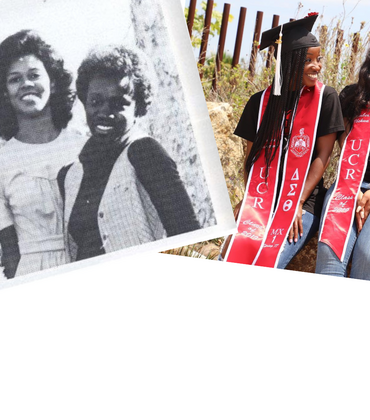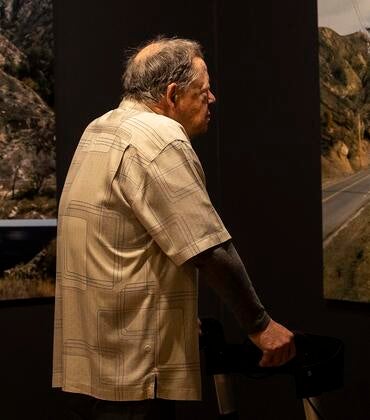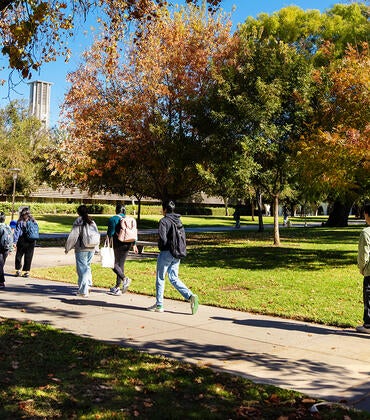There would be no taking the pandemic lightly in the Villanueva house. So declared the patriarch, father Manuel, to his wife and twin daughters, then seniors at UC Riverside.
Few-and-far-in-between trips to the supermarket were an orchestrated affair. Masks on, gloves on, hand sanitizer. No hugging anyone, the gregarious Manuel told his “muñecas,” Spanish for “dolls.”
It wasn’t enough. No one knows where Manuel contracted the coronavirus in spring 2020. More than a year after he passed from COVID-19, his family struggles to move beyond the loss of their sole breadwinner and the choreographer of their days.
Manuel emigrated from Peru to the U.S. in 1994. He’d grown up with his future wife, Liliana, in the same Peruvian village, but they only met after both had emigrated to the U.S. At a bus stop, Manuel summoned the courage for days to ask her if she knew the time of day. She noticed he had a watch on his wrist.
It wasn’t long before they married, and then came identical twins Amy and Annie, who shared a room with their parents in a one-bedroom apartment in Reseda. Manuel worked maintenance jobs, for the past few years at a country club. Rent was paid first, then utilities. What was left went for food. What was still left, if anything, went for clothes.
After 25 years of marriage, on Saturdays — family cleaning day — he still sang in his tenor voice to Liliana, whom he called “Nena,” songs of their native Peru from performers including Los Pasteles Verdes and Leodan.
“I don’t remember a time when he wasn’t singing,” said Annie, 23, wearing a “First Generation” UCR T-shirt; her identical twin sister, Amy, was sitting beside her, also wearing a UCR T-shirt.
When the coronavirus struck, it sparked some debates between Manuel and Liliana.
“My dad was really scared of the virus; he took it really seriously,” said Amy Villanueva. Her mother was skeptical of COVID-19, a posture she now regrets, saying she is a “true and firm believer of this horrible disease.”
In April 2020, COVID-19 darkened their door. Manuel, 67, was the first diagnosed, followed by Liliana and their twin daughters.
Mom was scared to go to the hospital. She Googled at-home remedies for the family involving ginger, lemon, onion, garlic, and honey. They inhaled steam from eucalyptus.
The twins’ and their mother’s symptoms were moderate to severe. They found much support from UCR Student Health, including “constant communication” from Dr. Kenneth Han. Student Affairs stepped in, providing counsel and gift cards to Target and Stater Brothers.
Eventually, Manuel’s breathing became labored, and he drove himself to the hospital. Things turned serious quickly, and he was intubated. But after about three weeks, the tubes came out, and his prognosis improved. He sat up and spoke with his wife and daughters. He’d be home soon, doctors said, and they talked about his rehabilitation.
But pneumonia struck a couple days later, and Manuel was placed on a respirator again.
“I didn’t think it was actually happening to my family,” Amy said. “It was a shock to accept my dad was in the hospital. I thought, ‘They must have the wrong person. My dad is not on a ventilator.’”
The hospital staff put the twins on a FaceTime call with their father, who was intubated, and they broke down.
May 7, the family was asked to come to the hospital.
“I asked, ‘Why are you guys doing this? Is my dad dying?’” Amy said. The hospital staff wouldn’t answer.
They were allowed to be with him only 10 minutes. Tears come quickly discussing his end.
“We didn’t get to say a proper goodbye,” Annie said. “We knew it was bad, but we didn’t know how bad it was.”
Their only sense of normalcy now is the half-second when they wake. Then their new truth settles on them. Their dad, the family’s provider and shepherd, is gone. They remain with their mother in their apartment of many years in Reseda, no one to walk them to and from the car at night in a neighborhood the girls say can be dangerous.
“I didn’t think it was actually happening to my family,” Amy said. “It was a shock to accept my dad was in the hospital.”
They are scraping by on some savings; Annie has a job while attending graduate school at USC; Amy has recently started a job. They remember their father’s mantra: “Every month, we’re just going to do rent first. We don’t want to get kicked out.”
The family argues a lot, which they know is a product of the stress and looming sadness.
“It’s just completely different without my dad,” Annie said. “It’s not whole; it’s not complete.”

Manuel, who spoke Spanish almost exclusively, was like many parents of first-generation students. His daughters were infused with the unrealized ambitions of the parents. He didn’t live to see Amy and Annie’s graduation in summer 2020.
“If he had lived one more month, he could have been there,” said Annie, who describes their pandemic-era virtual graduation as “empty” without her father.
“We didn’t get to say a proper goodbye,” Annie said. “We knew it was bad, but we didn’t know how bad it was.”
When the subjects of COVID-19 denial and vaccination resistance are broached, the twins become agitated.
“It’s like your annual flu shot,” Amy said. “It makes no sense. I don’t get it.”
“Basically, they are saying what we went through is not real; what we went through is a joke,” Annie said. “They will change their minds when they lose someone. They will understand.”
Header Photo: A photo of Manuel Villanueva, center, sits among other family photos as part of a memorial at his family’s home in Reseda. (UCR/Stan Lim)



